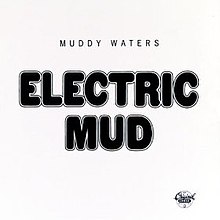Electric Mud
| Electric Mud | |||||
|---|---|---|---|---|---|
 |
|||||
| Studio album by Muddy Waters | |||||
| Released | October 5, 1968 | ||||
| Recorded | May 1968 | ||||
| Studio | Ter Mar Studios, Chicago, Illinois | ||||
| Genre | Blues, psychedelic rock | ||||
| Length | 36:54 | ||||
| Label | Cadet LPS 314 | ||||
| Producer | Marshall Chess, Charles Stepney | ||||
| Muddy Waters chronology | |||||
|
|||||
| Rotary Connection chronology | |||||
|
|||||
| Professional ratings | |
|---|---|
| Review scores | |
| Source | Rating |
| Allmusic | |
Electric Mud is the fifth studio album by Muddy Waters, with Rotary Connection serving as his backing band. Released in 1968, it imagines Muddy Waters as a psychedelic musician. Producer Marshall Chess suggested that Muddy Waters record experimental, psychedelic blues tracks with members of Rotary Connection in an attempt to revive the blues singer's career.
The album peaked at #127 on the Billboard Pop Albums chart. It was controversial for its fusion of electric blues with psychedelic elements, but was influential on psychedelic rock bands of the era.
In 1967, Marshall Chess formed Cadet Concept Records as a subsidiary of Chess Records. The label's first release was the self-titled debut album of the psychedelic band Rotary Connection, whose members Chess described as "the hottest, most avant garde rock guys in Chicago". As a result of the album's success, Chess felt that he could revive the career of bluesmen Muddy Waters and Howlin' Wolf by recording two albums of experimental, psychedelic blues with members of Rotary Connection as the backing band for the singers, producing the albums Electric Mud and The Howlin' Wolf Album. Chess hoped the new albums would sell well among fans of psychedelic rock bands influenced by Muddy Waters and Howlin' Wolf. According to Muddy Waters, "Quite naturally, I like a good-selling record. I was looking at it because I played for so many of these so-called hippies that I thought probably I could reach them."
...
Wikipedia
